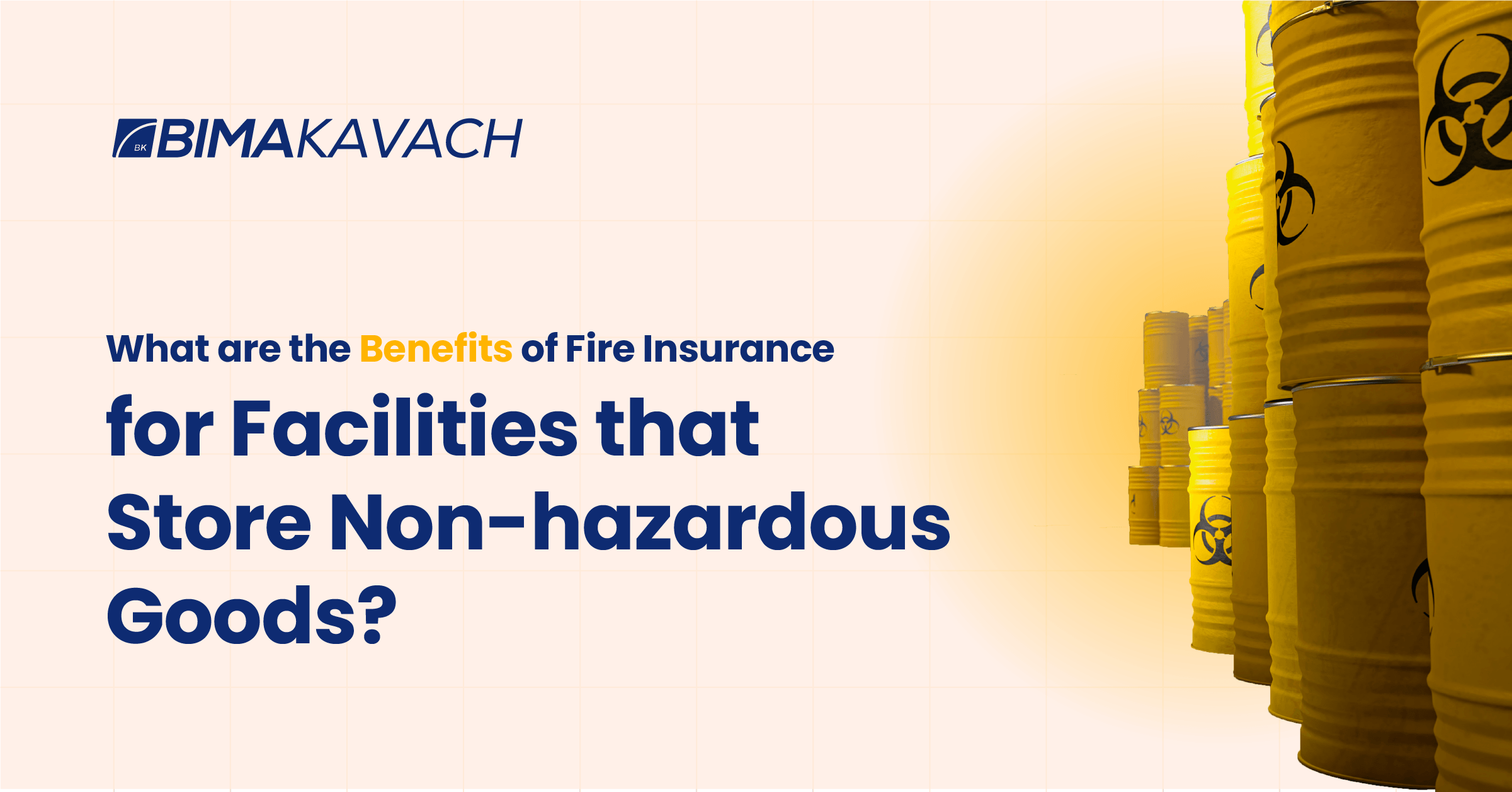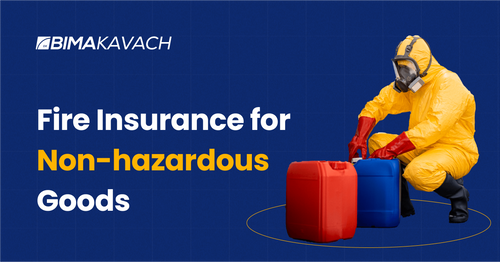In today's unpredictable business landscape, entrepreneurs and business owners face a multitude of risks that can significantly impact their operations. While the threat of fire is a concern for every business, it becomes even more crucial when dealing with non-hazardous goods. The potential loss of valuable inventory, assets, and the disruption of business operations can be devastating. This is where fire insurance steps in as a vital tool to mitigate such risks.
Fire insurance is a specialized form of coverage that provides financial protection in the event of fire-related damages to properties and assets. Typically, this type of insurance is associated with high-risk industries dealing with flammable materials. However, it is equally important for businesses involved in storing or manufacturing non-hazardous goods.
In this article, we will explore the significance of fire insurance for non-hazardous goods and why it should be a crucial part of every business owner's risk management strategy. We will look into the various aspects of fire insurance, including the coverage it offers, potential exclusions, and the steps businesses can take to secure comprehensive protection against fire-related perils.
Let’s proceed then!
What is Fire Insurance for Non-hazardous goods?
Fire insurance for non-hazardous goods is a type of insurance coverage specifically designed for businesses that deal with non-hazardous or non-flammable materials. It provides financial protection in the event of fire-related damages to the insured property, assets, and inventory. While non-hazardous goods may not pose an immediate risk of combustion or explosion, the risk of fire still exists due to factors like electrical faults, faulty equipment, or external causes such as arson or neighboring fire incidents. Fire insurance for non-hazardous goods helps businesses mitigate the potential losses and expenses resulting from such fire incidents.
Get Free Quote in Minutes
What are the inclusions in Fire Insurance for Non-hazardous goods?
The specific inclusions in a fire insurance policy for non-hazardous goods can vary depending on the insurance provider and the policy terms. However, here are some common inclusions that are covered in a typical policy:
- Property Damage: Fire insurance for non-hazardous goods covers the cost of repairing or rebuilding damaged property, including buildings, structures, and fixtures. This includes damages caused by fire, explosion, smoke, lightning, aircraft damage, bush fire, heat, and firefighting efforts.
- Inventory and Contents: The policy generally includes coverage for the replacement or repair of non-hazardous goods, inventory, stock, and other contents that are damaged or destroyed by fire. This can include raw materials, finished products, equipment, machinery, furniture, and other business assets.
- Business Interruption: Fire insurance may provide coverage for the financial losses incurred due to the temporary shutdown or disruption of business operations caused by a fire incident. This can include lost income, ongoing expenses and additional costs incurred to resume operations.
- Additional Expenses: The policy may cover additional expenses incurred as a result of a fire incident, such as temporary relocation costs, renting alternative facilities, or expediting repairs and replacements to minimize business interruption.
- Firefighting Costs: Fire insurance policies typically cover reasonable costs incurred for firefighting efforts, including fees paid to fire departments, fire suppression systems, and other firefighting measures required to mitigate the fire.
What is not covered in Fire Insurance for Non-hazardous goods?
While the specific exclusions in fire insurance for non-hazardous goods can vary between insurance providers and policy terms, here are some common exclusions that are typically found in fire insurance policies:
- Willful Acts: These policies usually exclude coverage for damages caused by willful acts or intentional actions of the insured or any person acting on their behalf.
- War and Terrorism: Damages caused by war, acts of war, acts of foreign enemies, hostilities, civil war, rebellion, revolution, insurrection, or terrorism are typically excluded from fire insurance for non-hazardous goods.
- Nuclear Risks: Fire insurance policies typically do not cover damages caused by nuclear reactions, nuclear radiation, or nuclear materials.
- Electrical and Mechanical Breakdown: Fire insurance policies usually exclude coverage for damages resulting from electrical or mechanical breakdowns ( for example, short circuit), unless a separate coverage extension is included or a machinery breakdown policy is obtained.
- Temperature change- Any loss or damage due to temperature changes to Non-hazardous products stored in a facility is not covered.
- Theft of goods- If an item is stolen from the Non-hazardous Goods Storage, no coverage is offered. However, you can avail the coverage as an add-on.
- Pollution: Damages resulting from pollution or contamination may be excluded from coverage.
- Negligence: These policies may exclude coverage for damages resulting from the insured's negligence, non-compliance with safety regulations, or failure to maintain the property in a reasonable condition.
- Stored Vehicles or Flammable Liquids: Fire insurance policies may exclude coverage for damages caused by fire to vehicles stored within the insured premises or damages resulting from the storage of flammable liquids.

What are the benefits of Fire Insurance for facilities that store non-hazardous goods?
Fire insurance offers several significant benefits, for facilities that store non-hazardous goods. Here are some key advantages:
Property Protection: Fire insurance safeguards the physical structure and contents of the facility against fire-related damages. In the event of a fire, insurance coverage can help cover the cost of repairing or rebuilding the facility, including any damage to equipment, inventory, and other assets.
Financial Security: Fire insurance provides financial security to facility owners or tenants by offering compensation for losses incurred due to fire damage. This compensation can help alleviate the financial burden of rebuilding the facility and replacing damaged goods, minimizing the impact on business operations.
Business Continuity: A fire can cause significant disruptions to business operations, leading to temporary closure or loss of production. With fire insurance, the financial support received can aid in the swift recovery and resumption of operations. It can cover the costs of relocation to a temporary facility, renting equipment, and replacing inventory, allowing the business to continue functioning during the recovery phase.
Liability Coverage: Fire insurance may also include liability coverage, which protects the facility owner or tenant from legal claims arising from the fire. If the fire spreads to neighboring properties or causes harm to individuals, the insurance can assist in covering legal expenses and potential damages awarded.
Peace of Mind: Having fire insurance provides peace of mind to facility owners or tenants, knowing that their investment is protected against fire-related risks. It allows them to focus on their core operations without constantly worrying about the potential financial ramifications of a fire.
Compliance and Lender Requirements: In some cases, fire insurance may be a mandatory requirement to comply with local regulations or meet the demands of lenders. If the facility is financed through a loan, the lender may require fire insurance as a condition for approval. Additionally, local authorities may mandate fire insurance to ensure public safety and mitigate potential risks.
The footnote:
From the discussion above, we have seen that by understanding the importance of fire insurance for non-hazardous goods, businesses can proactively safeguard their assets and minimize potential losses. Whether it's a retail store, warehouse, or manufacturing facility, having the right insurance coverage can make a significant difference in restoring operations and minimizing financial setbacks following a fire incident. Fire insurance for non-hazardous goods is not a luxury but a necessity for businesses operating in various industries. While these goods may not pose an immediate risk of combustion or explosion, the devastating consequences of a fire can still impact operations and lead to significant financial losses.
Investing in fire insurance for non-hazardous goods is a proactive approach to risk management. It allows businesses to navigate the uncertainties of the modern business landscape with confidence. However, to make the most of fire insurance, businesses should thoroughly evaluate their specific needs and work closely with insurance professionals to customize policies that suit their requirements. Understanding the coverage options, exclusions, and deductibles associated with fire insurance is essential for making informed decisions and ensuring comprehensive protection.
Find out about various types of fire insurance policy

